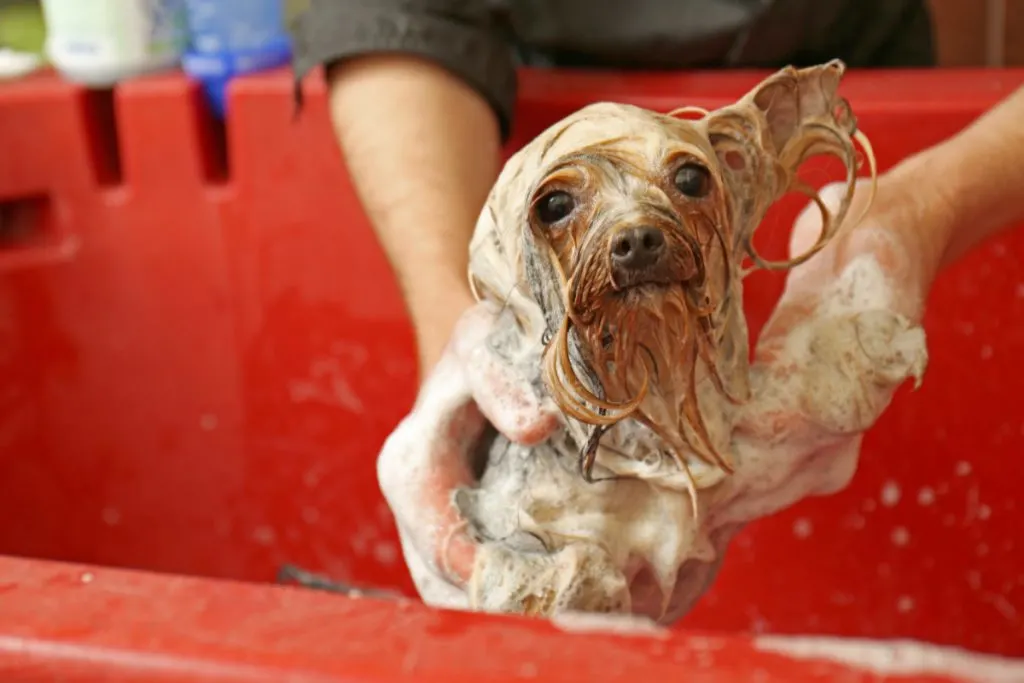It seems like it is more common than ever for dogs to experience allergies. Luckily for pet owners, there are also more solutions than ever before to bring our fur babies comfort. This article will help you make a game plan to effectively address your Yorkie’s itchy skin.

What Is Causing My Yorkie To Itch?
There are many reasons a dog may experience itchy skin, from food allergies to environmental factors. Beginning with a little investigation and then consulting with a trusted veterinarian is the most effective way to address the issue. First, you should evaluate the situation:
Is your Yorkie on a monthly flea and tick preventative?
Even if your Yorkie spends most of his or her time indoors, it is still important to administer monthly preventatives. Fleas can cause lots of itchy discomforts and these little villains will invade any home regardless of what level of cleanliness is maintained.
Keep a log of your Yorkie’s behavior and physical appearance
For example, when did you first notice your dog being itchy and uncomfortable?
Did he or she seem itchier on certain days? Or are they itchier in certain seasons? One of my Yorkies, Ziggy gets skin allergies every spring and fall.
Consider including photographs; take a picture of any visibly irritated skin when you see it. This way if your Yorkie’s skin changes before the veterinary appointment, you can show the veterinarian what your dog was experiencing.
Make a list of anything that you can recall your Yorkie being in contact with when he or she experienced itchy skin.
Did you offer a new type of treat? Did you recently change foods? Food allergies are not as common compared to environmental allergies but they are still a possibility and need to be ruled out.
Does your dog have gastrointestinal signs such as diarrhea? Some dogs will experience that along with itchiness, especially with food allergies.
Did you try a new shampoo or grooming product? Some dogs are sensitive to certain ingredients in grooming products.
Does your Yorkie lay on the rug? Some dogs are irritated by wool rugs, for example. Or if you recently shampooed the carpet, they may have a reaction to the cleaner used.
Did your Yorkie lay or roll in grass? Fleas, mites, a yard product, or pollen may be to blame.
Sometimes there may not be an obvious red flag; some allergies develop slowly over time; the cause could be something that he or she has been exposed to for years.

Compare
Compare the list of potential allergens, anything from food, grooming products, household products, or other environmental factors, against the days that you noticed your Yorkie was itching more than usual.
Consider discontinuing any new topical products or new treats/foods.

Make an appointment with a trusted veterinarian
Explain what symptoms your Yorkie is experiencing and present the results of your fact-finding mission for his or her consideration as they examine your Yorkie. They may propose diagnostics to get to the bottom of the itchiness to differentiate between the various causes.
You should also consider taking your dog to a veterinary dermatologist if there is one in your area.
What Skin Conditions Are Yorkies Prone To?
While some breeds are prone to skin conditions, Yorkies are generally not one of them.
Yorkies are most often prone to knee and vision problems according to the American Kennel Club (AKC). However, every individual dog has the potential to experience different skin conditions. The most common skin conditions experienced by dogs are:
- Allergies can be dietary or environmental, simple or complex.
- Flea bites. These are itchy to begin with, but some dogs will suffer from flea allergy dermatitis, wherein flea bites cause an allergic reaction.
- Mange, which is a condition that causes hair loss, itching and infection caused by mites.
- Ringworm is a fungal infection that also causes itching and hair loss.
- Alopecia causes hair loss.
- Bacterial and fungal (yeast) skin infections.
- Skin cancers (mast cell tumors and cutaneous lymphoma).
- Hypothyroidism can cause dry, itchy skin.

How to Treat Yorkie Allergies
Your next course of action will depend upon the cause of your Yorkie’s allergies. Here are some of the most common causes of allergies causing itchy skin and the solutions for them:
Allergy Testing
To get to the bottom of what is making your Yorkie itch, you may want to consider allergy testing. This is a method where a veterinarian or veterinary dermatologist will inject small amounts of allergens under your dog’s skin.
There is a negative and positive control. The allergen-injected areas are compared to the controls to see if there is evidence of a reaction. A positive test means that your dog will form a bump where the allergen is injected.
These look similar to hives. The positive spots are determined to be mild, moderate, or severe reactions. The results of these tests are used to formulate immunotherapies for your dog. We will talk about these next.
Some companies will advertise blood testing for allergies. These are not always recommended as they can be inaccurate and are not always a reliable way to determine what your dog is allergic to.
Immunotherapy
Once allergy testing has been performed, and the specific allergens are determined, a laboratory is used to develop ‘allergy shots’. These are injectable serum doses that include a small amount of allergen that increases in concentration over time.
The goal of this is to desensitize the immune system to the allergen. Most dogs will have an excellent response to this therapy, but others may have a less reliable improvement in their allergies.
This type of treatment is lengthy and usually takes weeks to months to see improvement, but the result is very worthwhile. This is the most effective way to deal with airborne allergies and some dogs may even be cured after treatment!
Resource: https://veterinarypartner.vin.com/default.aspx?pid=19239&id=4952556
Medication Therapy
Veterinarians may prescribe an oral or topical medication to offer your Yorkie relief from itching. Be sure to only administer medications approved by your veterinarian; some human medications may offer relief, but only a few are safe for your dog.
If your Yorkie is suffering after your veterinarian’s working hours, try calling an emergency veterinarian for advice should you need it. Some veterinarians such as Banfield Pet Hospitals also offer after-hours chatting services for these types of situations.

Dietary Therapy
Your Yorkie’s veterinarian may prescribe a limited ingredient prescription dog food. This may help eliminate potential allergens initially, but many dogs who suffer from food allergies continue to require a limited ingredient diet for the rest of their lives.
Most veterinarians carry Purina Pro Plan, Hills Pet (a/k/a Science Diet) Rayne, or Royal Canin prescription foods.
Some pet parents prefer other options such as natural or organic dog foods. Armed with the ingredients list from the food that agrees with your Yorkie, if you set out to research carefully and shop strategically, you will likely find what you are looking for. There are many other limited ingredient options available to consider.
Pet parents can have custom diets formulated with a veterinary nutritionist
Grooming Therapy
Some Yorkies benefit from a bath with a prescription medicated shampoo when they suffer an outbreak of skin irritation. Most commonly prescribed by veterinarians for dogs who suffer from seasonal allergies (pollen is the most likely culprit just like for humans), this treatment may be the most simple to administer. You simply bathe your Yorkie when he or she is itchy, allowing the medicated shampoo to sit on the skin for a few minutes, then rinse and dry thoroughly.
Flea Eradication
Yorkies who are suffering from flea allergies from flea bites will need the pests addressed promptly to improve. This means that the fleas on the dog, in your yard and in your home, must be vanquished immediately.
You may begin by using a flea spray to kill any fleas in your home. You will need to be thorough; fleas live in many nooks and crannies in homes. Alternatively, you may consider hiring an exterminator if you are uncomfortable doing so yourself or to be extra thorough.
While flea-eliminating shampoos are available over the counter, they do not always get the job done. Your veterinarian may prescribe a medicated flea bath to kill any fleas on your dog’s body. You will also need a flea comb to remove them from your Yorkie’s coat.
The last, and most critical step of the flea eradication process is starting your dog on a monthly flea and tick preventative to stay ahead of the issue reoccurring. This must be administered on a routine schedule (often monthly) to effectively break the flea life cycle. All animals in the home must be treated.

What does it mean if my Yorkie isn’t responding to traditional therapies?
Itchy skin in our pets is frustrating and not every dog will respond to treatment. The most common reason dogs don’t respond to therapy, or therapy begins to fail is because there is another underlying problem.
Many dogs will have inflamed or damaged skin secondary to allergies. This allows bacteria or fungi to take hold and cause a worse immune response.
These infections cause inflammation and can even cause worse itching. If your dog suddenly stops responding to its allergy medications it may be because an infection is brewing.
Your vet will likely want to perform diagnostics on your pet’s skin. These include skin scrapings, biopsies, or skin cultures.
Dogs that have been on antibiotics for long periods may be prone to resistant infections. Cultures will determine the type of bacteria growing and guide antibiotic usage.
Skin scrapings will help rule out parasites as a common cause of treatment failure. Biopsies will help determine if there is evidence of deep infection, immune-mediated disease, or cancer.

Conclusion
Itchy skin in Yorkies is very treatable but may take some effort to diagnose and address properly. Be sure to address itchy skin sooner rather than later; if your Yorkie is constantly scratching or biting himself or herself, the itchy area could become infected and painful.
Read this to learn more about common Yorkie skin problems.
Do you own a Yorkie who has itchy skin? Share your experience in the comments below.


Paula Simons
DVM
This article has been fact-checked and approved by Dr. Paula Simons DVM. You can read more about her on our About page.
